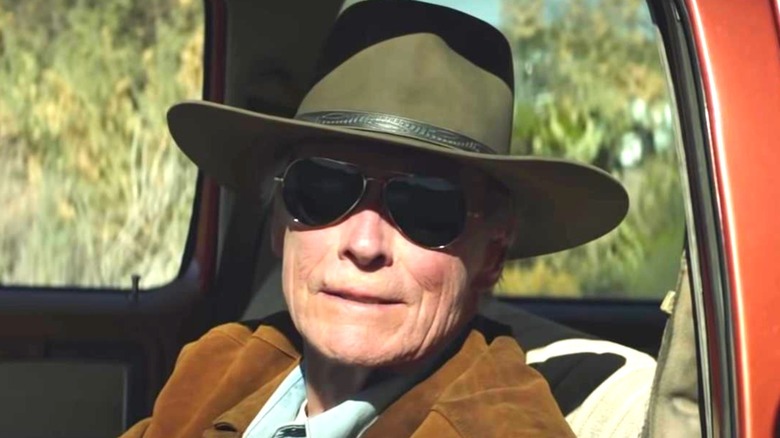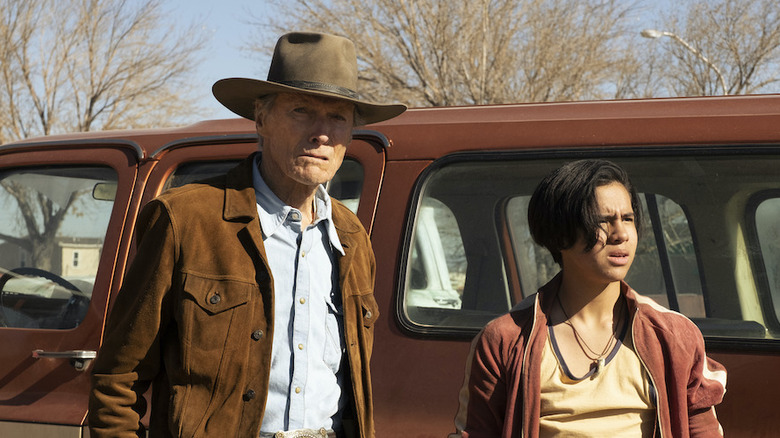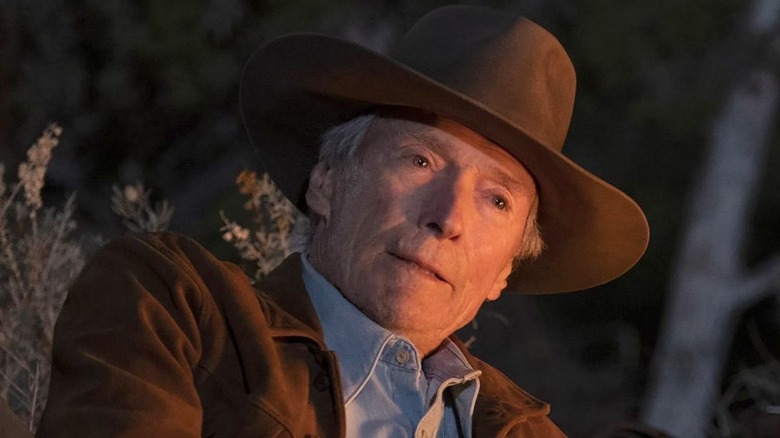The Ending Of Cry Macho Explained
Clint Eastwood is a Hollywood institution. The actor-turned-director has starred in films since the 1960s, when he rose to prominence worldwide thanks to his rough-and-tumble characters in spaghetti Westerns. He's won four Academy Awards for his work across "Unforgiven" and "Million Dollar Baby," in addition to an AFI Life Achievement Award and four Golden Globes. And at 91 years of age, Eastwood's showing no signs of slowing down any time soon.
He directed, produced, and starred in his latest venture, "Cry Macho," which simultaneously came out in theaters and on HBO Max. In it, Eastwood stars as former rodeo star Mike Milo, who's tasked with journeying into Mexico to bring the son of his old friend, Howard Polk (Dwight Yoakam), back to him. Mike finds the young Rafael (Eduardo Minett), and the two go on an emotional quest back to Texas, growing close, then apart, then close again along the way.
"Cry Macho" has all the machinations of a classic Eastwood neo-Western. And the "Cry Macho" ending has a way of pulling at viewers' heartstrings.
Everyone ends up where they need to be
Things get pretty tense toward the climax of "Cry Macho." Rafael discovers the only reason his father wants him at his ranch is so that he can have leverage when it comes to securing money from his Mexican investments. He needs Rafael's mother to work with him, and Rafael doesn't exactly take the news well that he's effectively a pawn. After a run-in with Aurelio (Horacio Garcia Rojas), Rafael gets over the betrayal. He seems all right with continuing the quest to the border because his dad still has horses and all kinds of animals for him to be part of.
The two say goodbye, as Mike isn't going back to Texas. Instead, he plans on returning to the village where he met Marta (Natalia Traven). The two formed a romance during their time hiding out in the town until it was safe for them to keep driving. Mike's heading back, and Rafael hands him the rooster, Macho, to serve him well throughout the rest of his trek.
It's an ending that's both happy and sad. Rafael and Mike ended up where they needed to be to get out of their respective bad situations in life. But it's sad because they both filled a role for one another. Rafael functioned as a surrogate child for Mike, while Mike was arguably a better dad than what Rafael could expect from Howard. Hopefully, the two meet each other once again, but for the time being, they helped one another not just on the physical journey but on an emotional one, too.
A rebuke of traditional masculinity
Think about a traditional Western movie protagonist from the 1960s or '70s. You probably think of a grizzled man who doesn't take any guff from anybody and is more than happy to resort to violence to solve his problems. That ideal is challenged in "Cry Macho," which suggests there's another way to be manly without having it scar your life.
When Rafael tells Mike why he named his rooster "Macho," he discusses how "macho" means "strong," and that's what he aspires to be. Mike clearly led a "macho" lifestyle earlier in life as a former rodeo hand, but it's left him broken and lonely. He hung out around his house by himself all day every day before Howard came to him with a job. He lost everyone close to him, and as Mike alludes to repeatedly throughout the film, masculinity can take many forms.
In one scene, Mike tells his partner the story of how his wife and child died, and in the middle of it, a tear forms down his face. It's hard to imagine many other Eastwood characters from several decades ago ever crying, yet here we are. Even in the climax, when Mike takes the gun from Aurelio, he could've very easily shot him dead. It would've saved them both a lot of trouble, but instead, Mike and Rafael merely steal his car and leave Aurelio in the desert. It's a non-violent solution to getting out of a jam, and by the end, it suggests there are alternate paths men can take that don't result in bloodshed.


